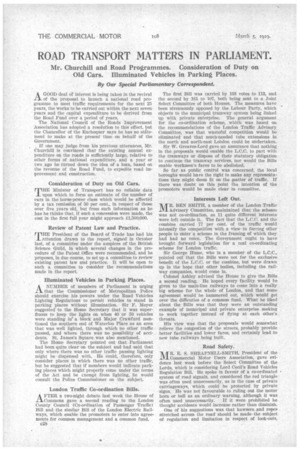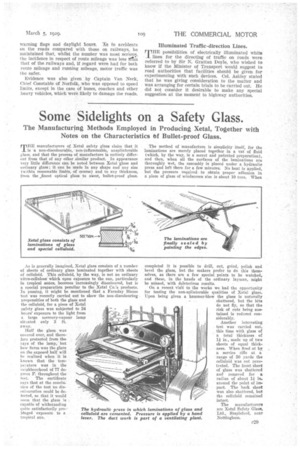ROAD TRANSPORT MATTERS IN PARLIAMENT.
Page 50

Page 51

If you've noticed an error in this article please click here to report it so we can fix it.
Mr. Churchill and Road Programmes. Consideration of Duty on Old Cars. Illuminated Vehicles in Parking Places.
By Our Special Parliamentary Correspondent.
A GOOD deal of interest is being taken in the revival of the proposal to launch a national road programme to meet traffic requirements for the next 25 years, the works to be carried out within the next seven years and the capital expenditure to be derived from the Road Fund over a period of years.
The National Council of the Roads Improvement Association has adopted a resolution to this effect, but the Chancellor. of the Exchequer says he has no stAemerit to make at the present time on behalf of the Government. ._ If one may judge from his previous utterances, Mr. Churchill is convinced that the existing annual expenditure on the roads is sufficiently large, relative to other forms of national expenditure, and a year or two ago he turned down the idea of a loan, based on the revenue of the Road Fund, to expedite road improvement and construction.
Consideration of Duty on Old Cars.
THE Minister of Transport has no reliable data upon which to form an estimate of the number of ears in the horse-power class which would be affected by a tax remission of 50 per cent., in respect of those over live years old, but from such information as he has he thinks that, if such a concession were made, the cost in the first full year might approach £1,500,000.
Review of Patent Law and Practice.
rpHE President of the Board of Trade has hail his JL attention drawn to the report, signed in October last, of a committee under the auspices of the British Science Guild, in which several changes in the procedure of the Patent Office were recommended, and he proposes, in due course, to set up a committee to review existing patent law and practice. It will be open to such a committee to consider the recommendations made in the report.
Illuminated Vehicles in Parking Places.
ANUMBER of members of Parliament is urging that the Commissioner of Metropolitan Police should exercise his powers under the Road Vehicles Lighting Regulations to permit vehicles to stand in parking places without illumination. Sir F. Meyer suggested to the Home Secretary that it was superfluous to keep the lights on when 40 or 50 vehicles were standing in' a block and Major Craltfurcl mentioned the Southern end of Waterloo Place as an area that was well lighted, through which no other traffic passed, and where there was no possibility of accidents. St. James's Square was also mentioned.
The Home Secretary pointed out that Parliament had been quite clear on the subject and had said that only where there was no other traffic passing lighting might be dispensed with. He could, therefore, only consider places in which there was no other traffic, but he suggested that if members would indicate parking places which might properly come under the terms of the Act and be cmempt from lighting; he would consult the Police Commissioner on the subject..
London Traffic Co-ordination Bills.
AFTER a two-night debate last week the House of Commons gave a second reading to the London County Council (Co-ordination of Passenger Traffic) Bill and the similar Bill of the London Electric Railways, which enable the promoters to enter into agreements for common management and a common fund.
c28 The first Bill was carried by 168 votes to 113, and the second by 161 to 107, both being sent to a Joint Select Committee of both Houses. The measures have been strenuously, opposed by the Labour Party, which objects to the municipal tramway system being linked up with private enterprise. The general argument for the co-ordination scheme, which was based on the recommendations of the London Traffic Advisory Committee, was that wasteful competition would be eliminated and that much-needed tube extensions in the north and north-east London Could be undertaken. Sir W. Greaies-Lord gave an assurance that nothing in the proposals would enable the L.C.C. to part vvith the tramways or dispose of their statutory obligation to continue the tramway services, nor would the Bills enable workmen's fares to be abolished.
So far as public control was concerned, the local boroughs would have the right to make any representations they might deem fit on the matter of traffic. If there was doubt on this point the intention of the promoters would be made clear in committee.
Interests Left Out.
MR. BEN SMITH, a member of the London Traffic Advisory Committee, maintained that the scheme was riot co-ordination, as 11 quite different interests were left outside it. The fact that the L.C.C. and the combine carried 77 per cent, of the traffic would intensify the competition with a view to forcing other people to enter a scheme in the framing of which they had had no voice. The Government ought to have brought forward legislation for a real co-ordinating scheme for London traffic.
Sir George Hume, who is a member of the L.C.C., pointed out that the Bills were not for the exclusive benefit of the L.C.C. or the combine, but were drawn up in the hope that other bodies, including • the railway companies, would come in. Colonel Ashley advised the House to give the Bills a second reading. He hoped every facility would be given to the main-line railways to come into a really big scheme for the whole of London, and that some agreement would be hammered out, which would get over the difficuties of a common fund. What he liked about the Bills was that they were an outstanding example of municipal and private enterprise seeking to work together instead of flying at each other's throats. • His view was that the 'proposals would somewhat relieve the congestion of the streets, probably provide better facilities and lower fares, and certainly lead to new tube railways being built.
Road Safety.
MR. E. S. SHRAPNELL-SMITH, President of the Commercial Motor Users Association, gave evidence last week before the Select Committee of the Lords, which is considering Lord Cecil's Road Vehicles Regulation Bill. He spoke in favour of a co-ordinated system of road signals, and considered the red triangle was often used unnecessarily, as in the case of private carriageways, which could be protected by private signs. He was not favourable to ruling out the motor horn or hell as an ordinary warning, although it was
often used unnecessarily. If it were prohibited he thought accidents would increase rather than diminish. One of his suggestions was that hawsers and ropes . stretched across the road should be made the subject of regulation and limitation in respect of look-outs,
warning flags and daylight hours. 'Xs to accidents OR the roads compared with those on railways, lie maintained that, whilst the number was most serious, the incidence in respect of route mileage was less teal that of the railways and, if regard were had for both route mileage and running mileage, motor traffic was the safer.
Evidence was also given by Captain Van Neck, Chief Constable of Norfolk, who was opposed to speed limits, except in the case of buses, coaches and other heavy vehicles, which were likely to damage the roads. Illuminated Traffic-direction Lines.
THE possibilities, of electrically illuminated white . lines for the directing of traffic on roads were referred to by Sir N. Grattan Doyle, who wished to know if the Minister of Transport would suggest to road authorities that facilities should be given for experimenting with such devices. Col. Ashley stated that he was giving consideration to the matter and was arranging for certain trials to be carried out. He did not consider it desirable to make any special suggestion at the moment to highway authorities.












































































































